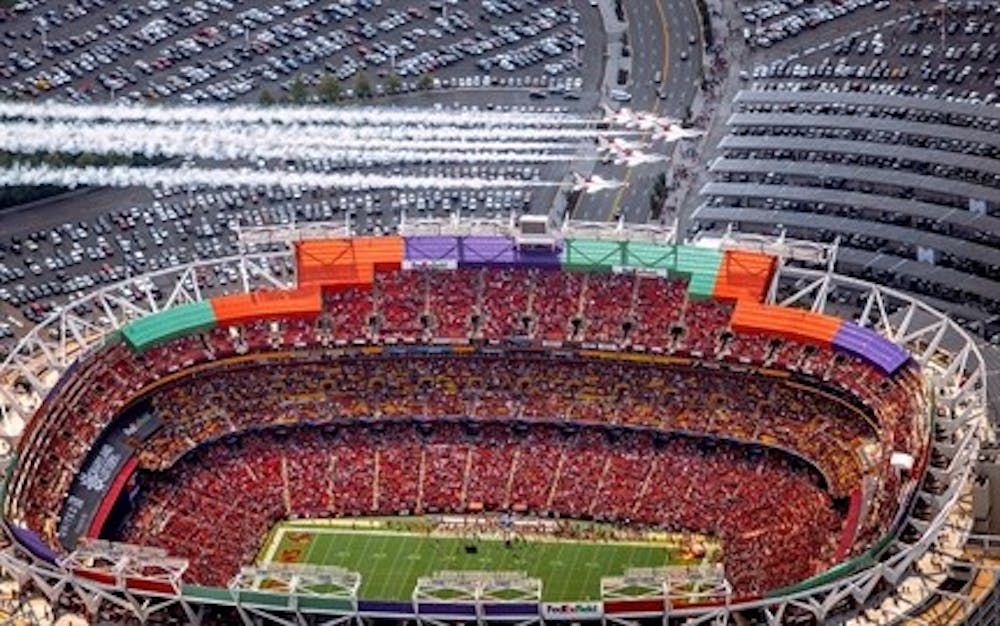
Early yesterday morning, the Washington football team decided to bow out of the long, arduous battle surrounding its name. After an extensive internal review that began July 3, the team elected to retire both the Redskins name and logo, which were at the center of controversy and scorn for the entirety of their reign.
Ray Halbritter, a representative for the Oneida Nation and the head of the Change the Mascot campaign, commended the move in a statement on Monday.
“This is a good decision for the country — not just Native peoples — since it closes a painful chapter of denigration and disrespect toward Native Americans and other people of color,” he said. “Future generations of Native youth will no longer be subjected to this offensive and harmful slur every Sunday during football season.”
An image that Native Americans voiced their displeasure about for decades, a racial slur slapping them in the face every night on SportsCenter, is now on its way out. The logo and name that was the face of an organization’s ineptitude for decades. An organization that alienated one of the National Football League’s (NFL) most loyal fanbases through years of wasted talent, missing on free agents and general failure to be consistently competitive. But now, change is coming. In the initial press release from the Washington football team, the organization announced that team owner Dan Snyder and head coach Ron Rivera are working to create a new name and design that everyone could be proud of.
That’s all good and well. It is long overdue considering that the name has been receiving heavy public criticism for close to 50 years. However, the current context of our society has demanded swift and symbolic change from corporate entities. The initial push to once again change the team’s name came amid a perceived shift in the public opinion on race after the police killing of George Floyd in Minneapolis. Further discussions on race have caused other companies to shed racist caricatures, like Quaker dropping the Aunt Jemima brand and Mars moving away from the Uncle Ben figure.
But this moment comes as a bit of surprise for anyone familiar with this team and the owner. Snyder has been vehement in his resistance to changing the name of the football team. As mentioned before, there have been calls for the team to ditch the offensive name for the entirety of his tenure. In 2013, he told USA Today that the name would “NEVER” change for as long as he is the team owner. There were also many within the organization that believed Snyder would rather sell the team than change the name. For the longest time, it was clear which side of the ideological battle he was on.
So something had to change to force Snyder to abandon the hard stance he clung to for so many years before. On July 2, FedEx, the company with the naming rights for Washington’s stadium, requested that the team change the name. Combined with the request was a letter stating that FedEx would remove its name from the stadium after the 2020 season if the name stayed. This move alone would cost Snyder and the organization $45 million in revenue.
FedEx’s request was followed by swift action by a number of other companies that threatened Snyder’s bottom line. The same day Nike, the official uniform supplier for NFL, removed the team’s merchandise from its website. Retail marketplaces Amazon, Walmart and Target promised to stop selling the team’s gear if the name remained. Also, two major sponsors, PepsiCo and Bank of America, requested that the name be changed as well.
Naturally, in the spirit of capitalistic survival, the name had to be changed. The team couldn’t possibly lose all that money over a name that can be so easily removed. It would be idiotic for Snyder to resist the tide of symbolic changes in the name of racial equality just to hold onto an offensive name for the sake of it. So, in the name of money, Snyder and Washington swiftly decided to drop the name and move in a different direction.
Let the record show: The team should not be commended for making this decision. Washington gets absolutely no credit for making this decision. They were backed into a corner and had to act. This was simply a case of protecting their assets before they lost all of their money.
It is also important to note that there was no apology or accountability for the usage of the racist name and imagery for so long. Think of the moves by the Aunt Jemima brand; they actually referenced a stride towards racial equality in their press release. This sense of recognition on why the team name was wrong and racist is noticeably missing from Washington’s statement. There is no acknowledgment of why they are changing it, why Snyder, after 20 years of resisting, decided to remove the name that is a racial slur. The statement reeks of a “wiping your hands” of it, as the team hopes that they will be able to move on.
We should not commend entities for moving away from racist policies or racist imagery. There’s no pat on the back, no “good job, sport” for this team. They ought to be met with criticism as to why it took so long for them to make a change when a significant amount of people were telling them they were wrong. Snyder’s legacy is now forever tied to justifying using a racial slur for his team’s name and then whimpering away with his tail in between his legs when his sponsors threatened to take his money.
In the grand scheme of things, this is a positive. No longer will an offensive name be one of the 32 teams in the NFL, allowing some fans to actually be proud to call themselves fans of the team. However, it’s important to note what it took for this change to occur, exemplifying the greater work that has to be done in other realms.





